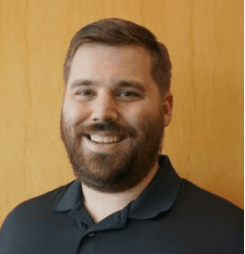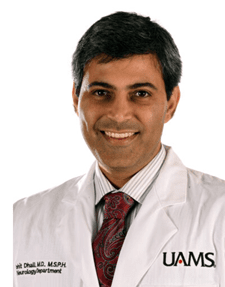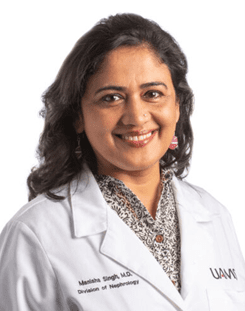
David Church, PhD, Assistant Professor, Department of Geriatrics, College of Medicine
“Oral Amino Acid Test Tolerance”
As humans age, we tend to lose muscle strength and mass. This leads to a loss of function and muscle health, where daily activities of life such as bending over, walking upstairs, and reaching for items on a high shelf become more difficult. This loss of muscle strength and mass can begin as early as 40 years of age. The term for this age-related decrease in muscle health has been coined sarcopenia. For most people wanting to improve their muscle health, participate in resistance exercise or consume a higher protein diet. These strategies consistently work in almost all populations, except those that develop sarcopenia, individuals become resistant to strategies that promote muscle health. We term this state anabolic resistance. Over time, this resistance to anabolic strategies leads to the loss of muscle strength and mass. As a result, it is important that we can identify and classify these conditions. This project represents the first attempt at developing muscle metabolic phenotyping based on temporal amino acid responses. Further, this project would be the foundational preliminary work to allow a simplification of one predictive amino acid characteristic. This project could lead to the development of a simple analytical tool that would provide clinicians the ability to discern alterations in muscle amino acid kinetics prior to a loss of function or overt development of sarcopenia.

Rohit Dhall, MD, MSPH, CPE, Professor, Department of Neurology, College of Medicine
“Impact of access to and utilization of digital resource library on self-efficacy in Parkinson Disease patients in rural Arkansas”
Most Arkansans with Parkinson’s Disease and their caregivers live in medically underserved areas, lack available resources, have trouble understanding their disease, and have a lack of providers specializing in PD care. These factors have led to Arkansans having some of the worst rates of hospitalization, readmissions, and Emergency Department visits in the US. These higher rates suggest a need for programs to improve the ability to manage their own disease for Arkansans with PD and help them recognize and navigate situations with a high risk of complications. Many different types of programs have used digital resources to address problems with accessing, receiving support, and improving health literacy in several chronic disease states. Unfortunately, for people with PD living in rural US, there is a lack of information on needs, behaviors, perceived barriers, and resources. This is also true for the Arkansas PD community. We propose to bring together our comprehensive team of PD experts who have extensive experience in engaging the PD community in Arkansas for educational and health promotion programs specifically designed for PD, with communication science experts and digital health experts, to understand the needs of our PD community, and develop an online resource library to provide information, resources, and tools to better manage PD, and connect the PD community with local support groups and exercise programs. We will also validate the impact of this on the self-efficacy of Arkansans with PD and their caregivers.

Manisha Singh, MD, Associate Professor, Department of Internal Medicine Nephrology, College of medicine
“A Pragmatic Approach for CKD Patient Education in the Delta”
Over 350,000 adult Arkansans have chronic kidney disease (CKD) and 9 out of 10 are unaware they have it. A “Know Your Kidney Number” poster campaign is being launched statewide to increase awareness and detection. As awareness increases, the demand for patient education will increase. Novel pragmatic approaches to reaching and educating patients earlier in their disease state and partnering with a broader pool of clinicians are needed. UAMS developed and copyrighted the “CKD: What You Need to Know” patient education system. Research showed almost 90% of the attendees could choose a modality after either tele-education or face-to-face education. Both transplant and home dialysis have better outcomes and are less costly compared to in-center hemodialysis. Harp’s Pharmacy has a successful medication therapy management program where pharmacists are provided time for patient-centered activities for patients. In this project, they will use their infrastructure to add CKD to their program in select pharmacies in the delta. This project empowers patients to be proactive partners in their health care, through education and accountability, by choosing both their RRT and performance goals to protect their kidneys is key to improving outcomes. Minorities, especially in rural areas, are less likely to receive most kinds of care including evidence-based practices, home dialysis, or transplantation. Developing patient-centered approaches to care such as this project can reduce disparities. One-on-one outreach to educate and motivate patients and seek their feedback can strengthen commitment and adherence to medical regimens. Learning what to expect can promote self-management behaviors.
